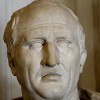“ But when men, with a spirit great and exalted, can look down upon such outward circumstances, whether prosperous or adverse, and when some noble and virtuous purpose, presented to their minds, converts them wholly to itself and carries them away in its pursuit, who then could fail to admire in them the splendour and beauty of virtue? ”
Marcus Tullius Cicero, On Duties (44 BC). copy citation
| Author | Marcus Tullius Cicero |
|---|---|
| Source | On Duties |
| Topic | beauty virtue |
| Date | 44 BC |
| Language | English |
| Reference | |
| Note | Translated by Walter Miller |
| Weblink | http://www.constitution.org/rom/de_officiis.htm |
Context
“For sensual pleasure, a most seductive mistress, turns the hearts of the greater part of humanity away from virtue; and when the fiery trial of affliction draws near, most people are terrified beyond measure.
Life and death, wealth and want affect all men most powerfully. But when men, with a spirit great and exalted, can look down upon such outward circumstances, whether prosperous or adverse, and when some noble and virtuous purpose, presented to their minds, converts them wholly to itself and carries them away in its pursuit, who then could fail to admire in them the splendour and beauty of virtue?
{38} XI.
As, then, this superiority of mind to such externals inspires great admiration, so justice, above all, on the basis of which alone men are called "good men," seems to people generally a quite marvellous virtue — and not without good reason;”
source


